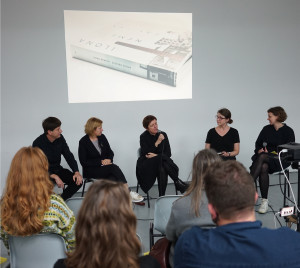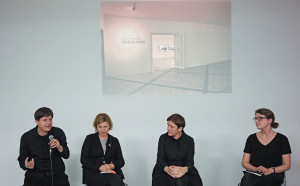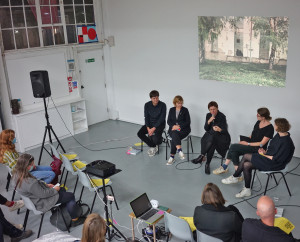Video
Eastern Sugar Book Launch
28 October 2021



The book launch of Ilona Nemeth’s book Eastern Sugar at The Showroom on 28 October 2021 marked the culmination of the international research project and exhibition EASTERN SUGAR. With artist Ilona Németh, editors Maja and Reuben Fowkes, respondent Ros Gray; moderated by Lily Hall, curator at The Showroom
Eastern Sugar was the name chosen by Générale Sucrière and Tate & Lyle for their joint venture to acquire sugar factories across Central Europe after the fall of communism in 1989. This book takes as its starting point artist Ilona Németh’s long-term research into the history of sugar production in the region, from its beginnings in the early nineteenth century to the rapid decline of the industry in the era of peak globalisation. Contributions dealing with the social and environmental legacies of Caribbean sugar plantations situate the sugar histories of Eastern Europe within the spread of a monocultural system based on (neo)colonial extractivism.
Through critical texts, conversations, and artistic interventions, Ilona Németh: Eastern Sugar restores complexity to the history of the Slovak sugar industry, and by extension the wider social and economic infrastructure of transition in Central Europe, while at the same time opening up planetary trajectories for postcapitalist alternatives.
The book is edited by Maja and Reuben Fowkes, and Ilona Németh with contributions from Edit András, Rado Baťo, Fedor Blaščák, Johanna Bockman, Kathrin Böhm, Anetta Mona Chișa, Cooking Sections, Annalee Davis, Maja And Reuben Fowkes, Ferenc Gróf, Dušan Janíček, Katarína Karafová, Peter Liška, Jason W. Moore, Ilona Németh, Michael Niblett, Raj Patel, Józef Rosta, Joanna Sokołowska, Olja Triaška Stefanović, Imre Szeman and Raluca Voinea.
EASTERN SUGAR is an international, interdisciplinary, contemporary visual art project with a focus on artistic research. The project reflects the recent facets of European history through the case of sugar industry in Central Europe. By the means of artistic research, curatorial cooperation, creation of new artworks, five international group exhibitions, participative installations, public and educational programmes, and a comprehensive interdisciplinary publication the project investigates the ‘clearing’ process of the Central-European sugar production. Sugar can be understood as a metaphor for the notion of Europe and world under constant transformation. EASTERN SUGAR strives to bring attention to the history of the sugar industry in Central Europe and to place it on the global map of the story of sugar. While doing so, it considers the colonial impacts of the past as well as the present.
30 years after 1989, the project intends to reflect on what impact these changes had on the Central European countries and Europe as such – especially considering the economic conditions, the aftermath of the so-called wild privatisation of the early 1990s, the sudden shift to capitalism, globalisation and adapting to the rules of the free market, as well as rules and regulations coming with the accession to the European Union.
Taking the sugar industry in Slovakia as a starting point, a case study or a metaphor, Eastern Sugar invites us to expand the discussion and critical reflection of the impact of socialist and neoliberal economics in the countries of Central Europe and beyond. The impulse for this undertaking started through Ilona Nemeth’s research and associated exhibition at Kunsthalle Bratislava in 2018, which called to be broadened on an international scale.
Using the language of contemporary visual culture, Eastern Sugar aims to shed a light on the social consequences of past political and entrepreneurial decisions; to pose the question of responsibility; and to diagnose the roots of the present crisis. But most of all, this project intends to explore possibilities for a better understanding of such procedures in the present and their future consequences. It conveys a belief that by learning about and understanding of our common past, we are better equipped to take informed decisions which will impact our common future.
Biographies
Maja and Reuben Fowkes are founders of the Translocal Institute for Contemporary Art and co-directors of the Postsocialist Art Centre (PACT) at the Institute of Advanced Studies, University College London. They are the authors of Art and Climate Change (Thames & Hudson, 2022), Central and Eastern European Art Since 1950 (Thames & Hudson, 2020) and editors of Ilona Németh: Eastern Sugar (Sternberg Press, 2021).
Their curatorial projects include the exhibition Potential Agrarianisms at Kunsthalle Bratislava; the multi-year programmes of the Anthropocene Reading Room and the Danube River School; the group shows Walking without Footprints, Like a Bird and Loophole to Happiness; and a trilogy of exhibitions on the revolutions of 1956, 1968 and 1989. They have written numerous chapters and journal articles, including in the Routledge Companion to Art and Climate Change, contributed to the exhibition publications of major museums, such as Ludwig Museum for Contemporary Art Vienna, ZKM Karlsruhe and Muzeum Sztuki, Lodz; and given lectures and led workshops in prominent contemporary art venues, including MoMA New York, ICA London, Whitechapel Gallery and Pérez Art Museum Miami. www.translocal.org
Ros Gray is Programme Director of the MA Art & Ecology and Reader in Fine Art (Critical Studies) in the Department of Art, Goldsmiths, University of London. Her numerous publications include the monograph Cinemas of the Mozambican Revolution: Anti-Colonialism, Independence and Internationalism in Filmmaking, 1968-1991, and (with Shela Sheikh) she co-edited the Third Text special issue The Wretched Earth: Botanical Conflicts and Artistic Interventions and made The Coloniality of Planting for Camden Art Centre’s Botanical Minds podcast series. She has also published a cycle of poems titled Comma. Ros is on the Editorial Board of Third Text and she is a member of the Critical Ecologies research stream. She is the Coordinator of the Goldsmiths Allotment, which provides a space for plant cultivation for staff and students, is a platform for various seasonal cultural events, workshops on aspects of sustainable gardening, and is a space for developing thinking around forms of ecological ‘care’ in the context of an educational institution. She is also leading the development of the Art Research Garden at Goldsmiths.
Ilona Németh is an artist, organiser and curator based in Slovakia. Her artistic practice involves the search for a balance between her personal experience of growing up in a country marked by political turmoil, and the universal history of the Eastern Bloc countries during the transition period from 1990 until today.
Between 2004-2019 she was Professor and Head of ‘Studio IN’, in the Department of Intermedia at the Academy of Fine Arts and Design in Bratislava. She has participated in numerous international exhibitions, and in 2001 together with Jiří Surůvka she represented the Czech and Slovak Republic at the Venice Biennial, exhibiting Invitation for a Visit. Her solo exhibitions include Dilemma, Ernst Museum, Budapest (2011); Identity of the Space, The Brno Haus of Arts, Brno (2012); and Eastern Sugar, Kunsthalle Bratislava (2018). She co-curated the exhibition series Private Nationalism Project, which travelled to Budapest, Bratislava, Krakow, Dresden, Pécs, Kosice and Prague (2014-2015); as well as Universal Hospitality in Vienna and Prague (2016-17). She is currently leading the international exhibition and research project Eastern Sugar in cooperation with the Slovak National Gallery, Bratislava and supported by Creative Europe. www.ilonanemeth.sk
Ilona Németh, Eastern Sugar is published by Sternberg Press. Co-published by the Slovak National Gallery, Bratislava, Slovakia.
With thanks to the Embassy of the Slovak Republic in London for support with this launch event.